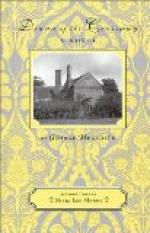‘Are you altogether cautious?’ Lady Dunstane wrote to Diana; and her friend sent a copious reply: ’You have the fullest right to ask your Tony anything, and I will answer as at the Judgement bar. You allude to Lord Dannisburgh. He is near what Dada’s age would have been, and is, I think I can affirm, next to my dead father and my Emmy, my dearest friend. I love him. I could say it in the streets without shame; and you do not imagine me shameless. Whatever his character in his younger days, he can be honestly a woman’s friend, believe me. I see straight to his heart; he has no disguise; and unless I am to suppose that marriage is the end of me, I must keep him among my treasures. I see him almost daily; it is not possible to think I can be deceived; and as long as he does me the honour to esteem my poor portion of brains by coming to me for what he is good enough to call my counsel, I shall let the world wag its tongue. Between ourselves, I trust to be doing some good. I know I am of use in various ways. No doubt there is a danger of a woman’s head being turned, when she reflects that a powerful Minister governing a kingdom has not considered her too insignificant to advise him; and I am sensible of it. I am, I assure you, dearest, on my guard against it. That would not attach me to him, as his homely friendliness does. He is the most amiable, cheerful, benignant of men; he has no feeling of an enemy, though naturally his enemies are numerous and venomous. He is full of observation and humour. How he would amuse you! In many respects accord with you. And I should not have a spark of jealousy. Some day I shall beg permission to bring him to Copsley. At present, during the Session, he is too busy, as you know. Me—his “crystal spring of wisdom”—he can favour with no more than an hour in the afternoon, or a few minutes at night. Or I get a pencilled note from the benches of the House, with an anecdote, or news of a Division. I am sure to be enlivened.
’So I have written to you fully, simply, frankly. Have perfect faith in your Tony, who would, she vows to heaven; die rather than disturb it and her heart’s beloved.’
The letter terminated with one of Lord Dannisburgh’s anecdotes, exciting to merriment in the season of its freshness;—and a postscript of information: ’Augustus expects a mission—about a month; uncertain whether I accompany him.’
Mr. Warwick departed on his mission. Diana remained in London. Lady Dunstane wrote entreating her to pass the month—her favourite time of the violet yielding to the cowslip—at Copsley. The invitation could not be accepted, but the next day Diana sent word that she had a surprise for the following Sunday, and would bring a friend to lunch, if Sir Lukin would meet them at the corner of the road in the valley leading up to the heights, at a stated hour.
Lady Dunstane gave the listless baronet his directions, observing: ’It’s odd, she never will come alone since her marriage.’




